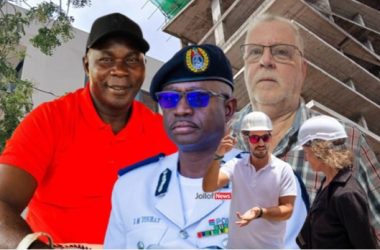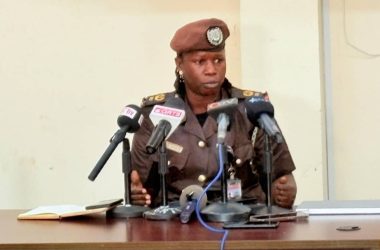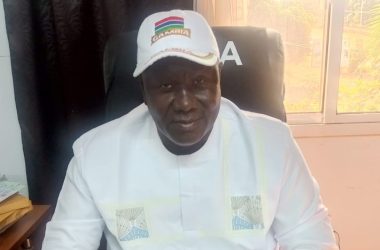-Corinne Duke, Human Rights Watch
By Yaya Dampha
Corinne Dufka, Senior Researcher at Human Rights Watch’s West Africa desk, has said that failure to bring justice to the people of Guinea could lead to worsening tragedy in the country.
Speaking to Jollofnews in an exclusive interview with this reporter, the human rights advocate who is based in the Senegalese capital of Dakar said two concurrent tragedies befell the people of Guinea; the death of the country’s president and the ensuing coup d’état which created an opportunity for the security forces and other rogue elements to commit violence against innocent civilians. But she also recognized the existence of opportunity created by recent development in the country.
The situation in Guinea Conakry, the latest African nation to have edged towards the brink of failure, has been at the centre of international discourse of late, refusing to wane. It appears to be more now about settling the issues surrounding the political stalemate there than fixing the heinous human rights violations meted out to the ordinary citizens who were only asking for democracy. The recent pact agreed between wounded former junta leader, Musa Dadis Camara and the regional bloc of ECOWAS seems to have brought some semblance of hope in the people. But, some fear, possibly at the cost of justice.
Are the victims of the callous actions of the Guinea Junta ever going to get justice? Will it be normal for political decisions to prevail over the normal course of respect for human rights? Others will argue that in the interest of peace, it will be better to let go. There have been occasional arguments that pursuing on establishing the truth behind the violations might risk jeopardizing the current progress.
But Corinne Dufka disagrees. ‘‘As Guinea moves forward they need the justice sector to hold those responsible for the violence accountable,’’ she argued.
The recently published UN commission of enquiry report has already been submitted to the Guinean authorities. Can the world, including human rights groups, rely on the current Guinean regime for reparation for the victims?
Dufka thinks that there is a marked line between reparation and justice. Although acknowledging that it might be difficult in terms of a stable Guinean government to say if total justice can be attained, she remained hopeful ‘‘since the authorities there have pledged to be committed to holding those responsible for the September violence accountable.’’ She maintained that Human Rights Watch has since recommended that those responsible be accountable and the victims be given adequate medical and other attentions. Dufka appeared especially concerned about the plight of women, whom she happily noted had been given guarantee of their security.
‘‘The commission documented one hundred and nine cases of sexual abuses. The participation of the women really attests to their commitment in seeing justice be done. They were really committed to the truth being known,’’ she said.
The Human Rights Watch expert sees no room for pessimism. ‘‘I think there is room for optimism,’’ she said, pointing to the enthusiasm demonstrated among ordinary Guineans for there to be free and fair election. That, she argued, largely explained the level of participation of the people in democracy.
The UN sanctioned commission of enquiry, in its report, clearly concluded that Guinea violated several provisions of the international human rights conventions it ratified. But that report fell short of concluding whether the said crimes can be described as crimes against humanity. This, to some, suggests the existence of disagreement over the issue. But Dufka clarified that commissions of enquiries weren’t judiciary enquiries. She said, however, that there was a great deal of evidence to suggest that the crimes committed in the country were indeed crimes against humanity.
‘‘We think it that way because the UN official enquiries concluded that as well,’’ she stated.
According to Dufka, it would be interesting to see what the commission of enquiry set up by the sidelined junta leader himself will be issuing in their report. She pointed out that that might serve as a gauge in that it will give the world a sense of the feeling as to how well they will pursue prosecutions. But, she indicated, given that it had already been noted that there had not been a lot of participation on the side of the victims, there will hardly be much confidence in that commission.
Plea on behalf of families of disappeared
When news about the massacre of civilians broke, the junta deliberately manufactured its own figure of the death toll, putting it far less than what the rest of the word was getting from various independent sources. It eventually emerged that as much as 40 dead bodies disappeared without traces. And also there were reports of people who disappeared without their relatives having a clue about their fate, as to whether they were killed or not.
According to Dufka, Human Rights Watch believes that the number is between hundred and fifty and two hundred, and that, she said, does not include a good number of the disappeared.
‘‘We can definitely say its more than the government figure,’’ stated, and added that Human Rights Watch has since asked the government to come plain and allow the families some sort of relief so that they can know what happened to their loved ones.
She charged that clearly the government was trying to down play the impact of the September 28 violence. But she said in their effort to ensure that the junta did not succeed, they and others engaged the officials in uncovering some mass graves from which bodies were eventually removed.
Hope for democracy
Regarding the postponement of a visit by the International Criminal Court (ICC), she described the move then as very reasonable. She admitted though that Dadis Camara’s arrival in Burkina Faso actually risked the chances of peace and security in the country as ‘‘it was thought that he was going to walk his way back to Guinea.’’
This, she said, could have created a division in the Guinean military, rendering the situation there worst. But, she went on, ‘‘the most important thing is that they have plans to go and they are going to go. Since they claimed the cancellation was not a security reason, that it was more of logistics.’’
Dufka described the assassination attempt on Dadis Camara and the subsequent changes at government level as having posed security risk for not only the people, but also human rights organizations as they did there findings. And as a way of allaying fears from some other ends about the fact that Abubakarr Toumba Diakite, the rogue military officer who attempted on the life of the Junta leader, being on the run, which many think might pose another risk, especially to human rights groups, Dufka argued that with Tumba in hiding and his men marginalized, there is hardly anything they can do. She said she thought there was tremendous progress for democratic transition in the country, and that she was less worried about human rights groups being threatened.
‘‘I think there is a lot of momentum for democratic election as well as justice,’’ she posited.
However, Dufka could not rule out treat from members of the presidential guard. This is especially obvious since this unit, which was under Dadis’ own command, has been identified alongside his former aid de camp ‘‘to hold the greater responsibility of the massacre.’’
She also pointed to members of the national gendarmerie as well as some police personnel as sharing some of the responsibilities. She therefore agreed that there was need for more research in to who was in command of those units.
She is however optimistic that something good might come out of the present dispensation. ‘‘It seems Konateh have done a good job as managing the potentially explosive divisions within the military,’’ she said, adding ‘‘he seems to be committed to a democratic transition. We would want that move forward and the transitional government to make concrete action on their commitment.’’
Trending :
- 1 day ago
- GDC Rejects CePRASS Survey, Calls Findings “Nonsense” And Politically Motivated
- 1 day ago
- UDP Responds To CEPRASS Poll, Says Elections Are Decided By Voters
- 2 weeks ago
- 9th Kankurang Festival Slated For 23rd- 25th January 2026
- 2 weeks ago
- Hundreds Paint Serekunda Red Following Senegal’s Triumph Over Morocco
- 3 weeks ago
- Barrow Describes NPP’s By-Elections Triumphs As ‘Referendum’ Between Governing Party & Opposition




